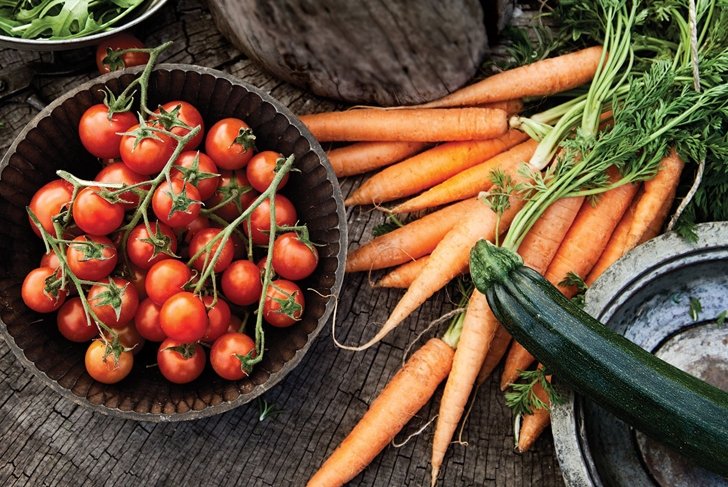
Carotenoids have nothing to do with the carotid artery. These substances provide the colours of brightly hued fruits and vegetables. And they contain a bunch of health benefits for us.
Carotenoids are natural pigments responsible for the vivid colours in our fruits and vegetables. There are several dozen carotenoids that fulfill a potent antioxidant function, including lycopene—well studied for its ability to reduce the risk of prostate cancer—and lutein and zeaxanthin—both important for eye health.
Beta carotene
Beta carotene is found in orange, yellow, and leafy green vegetables and fruits. Foods with bright colours such as sweet potato, carrots, broccoli, tomato, and cantaloupe are good sources of beta carotene. Consuming high amounts of beta carotene-containing foods may lead to a temporary yellowing of the skin.
Benefits
Once consumed, beta carotenes convert to vitamin A which is essential for eye, immune, and skin health. As an antioxidant, vitamin A protects our body from free radical damage and may lower our overall risk of cancer and heart disease.
Latest research findings
There is promising research on the use of beta carotenes for pre-cancerous mouth lesions (leukoplakia) and for age-related macular degeneration.
Supplement options
Beta carotene supplements, available in both capsule and gel forms, should not be used by anyone who smokes cigarettes as the combination can increase the risk of lung cancer and heart disease. There is no stated recommended daily amount of beta carotene, but if you can’t get five to six servings of beta carotene-containing foods per day, you can take a supplement with 10,000 to 83,000 IU per day. Because beta carotene is fat soluble, it should be taken with meals containing at least 3 g of fat for the best absorption.
Lutein and zeaxanthin
The only carotenoids that are found in the retina, specifically in the macula, lutein and zeaxanthin are thought to help protect against oxidative damage which researchers believe may have a role in age-related macular degeneration. Because they cannot be made in the body, it’s essential to get lutein and zeaxanthin from your food in the form of dark green leafy vegetables, such as kale or spinach, or from eggs.
Benefits
Acting as antioxidants, lutein and zeaxanthin filter high energy blue wavelengths and thus protect the eye. Their highest concentrations are around the retina and can be measured thanks to their pigmentation.
Latest research findings
Age-related macular degeneration (AMD) is a progressive disease and a leading cause of vision loss in aging people. A large study called AREDS2, involving patients with AMD, found that supplementation with lutein and zeaxanthin, along with one of four formulations containing vitamins C and E, zinc, and copper, decreased their likelihood of developing advanced AMD by 25 percent compared with those who did not take lutein and zeaxanthin.
Supplement options
Recent studies show that 10 mg per day of lutein and 2 mg per day of zeaxanthin are necessary for a therapeutic effect. Lutein and zeaxanthin supplements can be found at your local natural health store.
Lycopene
Lycopene is a carotenoid that gives red or pink foods their colour. Foods with the highest lycopene content include tomato, watermelon, pink grapefruit, and guava. The highest concentration is found in cooked tomatoes and foods made from tomato (tomato sauce, tomato paste).
Benefits
Lycopene’s antioxidant ability is almost twice as high as beta carotene. Many studies are looking at lycopene due to its beneficial effect on various cancers, including cancers of the prostate, skin, breast, lung, and liver. Lycopene is also being studied for its role in cardiovascular health.
Latest research findings
Most of the research on lycopene’s specific health benefits is focused on the treatment of benign prostatic hypertrophy (BPH) and prostate cancer. An 18 percent reduction in the risk of BPH was found in men who consumed the highest amounts of lycopene in their diet or supplements. Consuming a high-lycopene diet also decreased the risk for prostate cancer development.
Supplement options
Dosing of lycopene depends on the reason you plan to take the supplement as well as the quality of the supplement. As an antioxidant, it may be taken at 30 mg per day for up to eight weeks. To treat an enlarged prostate, it is recommended at 15 mg per day for six months. For the prevention or treatment of prostate cancer, the recommended dose is up to 120 mg in divided doses for one year. Consult your health care practitioner to ensure you take a dosage that’s right for you.
How best to absorb your carotenoids
Carotenoids are best absorbed when they’re consumed with some fat in your meal. Think about adding avocado to your meal or using extra-virgin olive oil, red palm oil, or avocado oil in your cooking. When foods containing carotenoids are cooked, they become more bioavailable. Try puréeing, sautéing, or roasting your vegetables.

